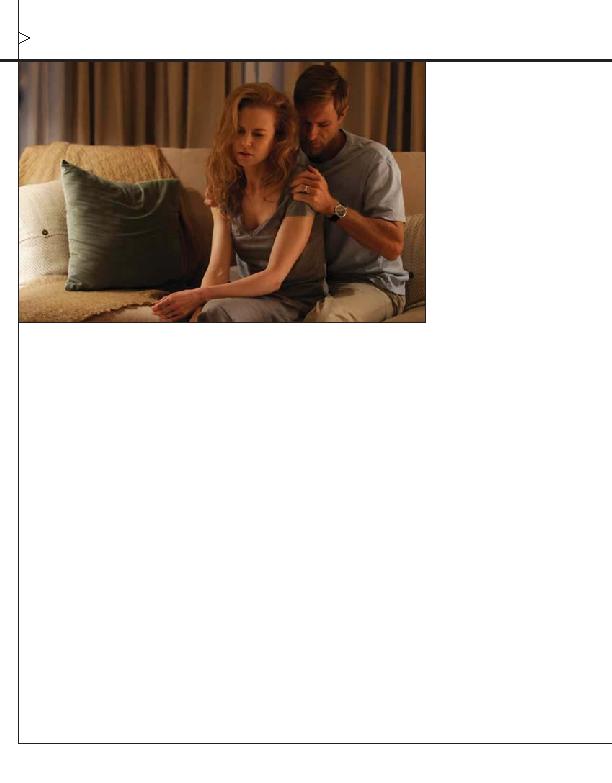
the loss of a child, but that doesn't mean it's a
comedy. "I don't think there's a joke in the
script," says playwright David Lindsay-Abaire,
who adapted his own Tony-nominated drama
for the screen. "I was trying to create characters
who were human. Whenever something horri-
ble happens, at least in my family, there's a very
dark streak of humor that makes its way into the
situation. More often than not, it's a coping
mechanism, but it's also because we are funny
people, so humor often comes at inappropriate
times and in inappropriate ways," he explains.
The play earned Lindsay-Abaire a Pulitzer.
to sell the movie rights for Rabbit Hole to Blos-
som Films, Nicole Kidman's production com-
pany. As he advises theater directors in the
original author's note of his published script,
"It's a sad play. Don't make it any sadder than
it needs to be." Laughter, he understood,
would get audiences through what might oth-
erwise feel like melodrama, and it would also
set apart material that had already been cov-
ered quite seriously in such films as Ordinary
People and In the Bedroom.
on-screen was to do the adaptation himself --
play; I didn't need a bad film version," he says.
And though it may sound like the writer was
angling for control, he was simply trying to
avoid the disappointment that had accompa-
nied his previous Hollywood experiences.
"Everything else I've ever worked on has been
miserable," sighs Lindsay-Abaire, whose previ-
ous screen credits include Robots ("A very sweet,
cute animated movie that wasn't the movie I
signed on to write") and Inkheart ("There's more
of my work in there, but that movie got so
chopped up and rewritten, and had a prologue
and epilogue tacked on," he says).
might have, since he wasn't shy about over-
hauling aspects of his own play. "I had lived
with these characters for five years. I knew
them so well, I didn't have to worry about
how they would respond in a new situation,"
he explains.
quently discuss grief counseling ses-
sions and their feelings about Jason
(Miles Teller), the teenage driver who
accidentally killed their son with his
car. Thus, the first idea added by Lind-
say-Abaire in the film was to present
these moments as proper cinematic
scenes. "One of the things the play had
going for it is that it had a fairly in-
volved off-stage life," Lindsay-Abaire
says. "For example, the support group
is talked about a lot in the play,
Howie's potential affair is hinted at,
and then there are things like the su-
permarket scene, where Becca has an
encounter with a woman and her
young son. In a film, we can go to that
support group and meet those people.
And even though I hadn't written
those scenes directly, I had already
written them in my head."
five actors unfolded to include other
characters and a whole world beyond
the domestic prison Becca and Howie
had created for themselves (on stage,
the same house they'd made to raise
sence, to the point that they end up deciding
to sell it). Howie also became a stronger char-
acter, with the idea that he responds to Becca's
emotional detachment by seeking attention
from another woman developing into a
proper subplot -- something that had inspired
performers to write Lindsay-Abaire in the past,
demanding to know whether Howie actually
cheats. "In the play, it's really up to the actor
to decide how he's going to play those scenes,"
he says. "If you really want to know what I
think, watch the movie."
group meetings with another grieving parent
named Gaby (Sandra Oh). These scenes con-
trast nicely with what Becca is going through
at the same time -- secretly meeting with Jason,
the young man who struck down her son. In
the play, it's Jason who reaches out to the griev-
ing family by writing a letter in which he asks
to meet them, though Lindsay-Abaire moved
that subplot out of the house. Now, Becca spots
Jason by chance and becomes the one to initi-
ate contact. "That was me putting on my
screenwriter's cap, trying to activate Nicole's
character more," Lindsay-Abaire explains.